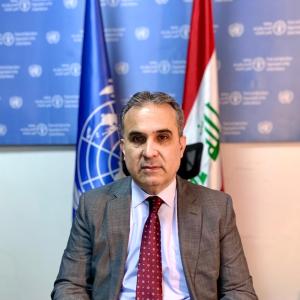FAO receives 2.2 million dollars from the Defense Threat Reduction Agency, DTRA/USA, to strengthen veterinary services in targeted provinces in Iraq
12 October 2020
The Food and Agriculture Organization of the United Nations, FAO, welcomes the additional contribution of 2.2 million dollars from the Defence Threat Reduction Agency, DTRA/USA, to strengthen veterinary services in targeted provinces in Iraq and build capacity in disease recognition, field and laboratory diagnostics, epidemiology, data collection and analysis, reporting and early warning systems for high‐threat animal diseases.
Dr. Salah ElHajjHassan, FAO Representative in Iraq, expressed FAO's commitment to strengthen the capacity of veterinary services to detect, diagnose, and report highly pathogenic animal diseases. He said, “As the whole world is dealing globally with the COVID-19 pandemic, a focus on community resilience through disease control is especially important. This project will strengthen the technical and institutional capacity of Iraqi veterinary services for effective surveillance and control of zoonotic and transboundary diseases to protect livestock from losses and reduce severe threats to human health and safety.” He also stressed the importance of partnership and mutual cooperation with national stakeholders and other entities working in the same field.
Despite the efforts made by the Government of Iraq, the monitoring and control programs are restricted and with insufficient resources due to low oil prices and the Corona Virus pandemic, which affected animal health services in border areas and increased the risk of spreading highly contagious animal diseases within the region.
The health system in Iraq is already struggling to cope with COVID-19. An enhanced early warning system combined with new strategies and policies, and provision of animal health services, will ensure that livestock, an essential livelihood source for Iraqis, remain healthy and free from zoonotic disease outbreaks. FAO will support veterinary services by improving communications between regional and central Iraqi authorities, as well as with the herding communities, in order to help mitigate the threat of highly‐pathogenic animal diseases within the region.
FAO is grateful to the United States of America, Defence Threat Reduction Agency, for this generous contribution that aims to expand the scope of the ongoing project, “Improving Delivery of Animal Health Services and Disease Surveillance in Iraq,” which brings the total amount contributed by DTRA to over 3.5 million dollars.

He started his career in 1984, as Senior Research Assistant in the Agricultural Research and Education Centre (AREC), American University of Beirut. From 1987 to 1991, he was Coordinator of the Student Training Programme, and also Agriculture and Horticultural Teacher for the Faculty of Agriculture, at the Lebanese University.
From 1991 to 1995, he worked as Agricultural Engineer at the Ministry of Agriculture, Bekaa Regional Office, Zahlah and was then assigned to the Agricultural Research Institute in the Tal Amara station, first as Head of the Crop Production Department and subsequently in charge of the Plant Protection Laboratory. From 2002 to 2006, he was Director of the Kfardane Research Station (Agricultural Research Institute). In 2008, he became Visiting Scientist at the International Maize and Wheat Improvement Centre (CIMMYT) and Coordinator of a project with the International Centre for Atomic Energy Agency, Vienna.
In 2010, he served as Advisor to the Minister for Agriculture of Lebanon. In 2011, he became President of the Pesticide Scientific Committee, Head of the Phytoplasma Committee and Director of the Agriculture and Rural Development Programme (ARDP) (EU-funded project). From 2010 to 2013, he represented Lebanon in negotiations with EU, Egypt, Jordan and Iraq. During his career, Mr Hajj Hassan also carried out a number of other functions. He represented the Lebanese Agricultural Research Institute (LARI) in several research programmes with the International Centre for Agricultural Research in the Dry Areas (ICARDA) and the American University of Beirut. He was Coordinator of the Mashreq/Maghreb project with ICARDA, representing Lebanon in the Steering Committee, as well as being the Head of the Sugar-beet Delivery and of the Wheat Delivery Committees. For a number of years, Mr Hajj Hassan worked for the preparation of FAO TCP projects and served as the National Director of a TCP project. He joined FAO in January 2014 as FAO Representative in Yemen. Mr Hajj Hassan succeeds Mr El Zubi as FAO Representative in Iraq.





